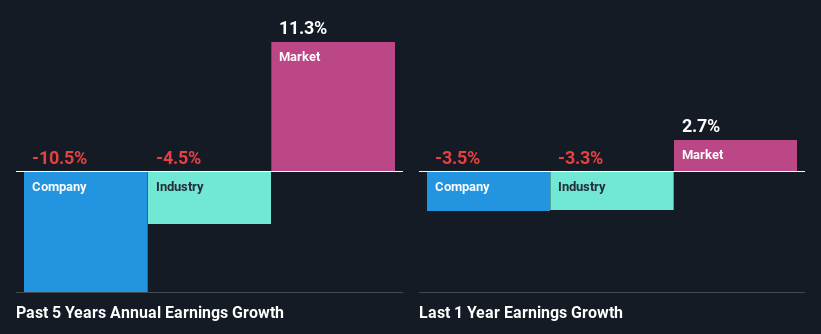The Berkeley Group Holdings plc's (LON:BKG) Fundamentals Look Pretty Strong: Could The Market Be Wrong About The Stock?
Berkeley Group Holdings (LON:BKG) has had a rough month with its share price down 6.1%. However, the company's fundamentals look pretty decent, and long-term financials are usually aligned with future market price movements. Specifically, we decided to study Berkeley Group Holdings' ROE in this article.
Return on Equity or ROE is a test of how effectively a company is growing its value and managing investors’ money. In short, ROE shows the profit each dollar generates with respect to its shareholder investments.
Check out our latest analysis for Berkeley Group Holdings
How Do You Calculate Return On Equity?
Return on equity can be calculated by using the formula:
Return on Equity = Net Profit (from continuing operations) ÷ Shareholders' Equity
So, based on the above formula, the ROE for Berkeley Group Holdings is:
14% = UK£466m ÷ UK£3.3b (Based on the trailing twelve months to April 2023).
The 'return' is the amount earned after tax over the last twelve months. So, this means that for every £1 of its shareholder's investments, the company generates a profit of £0.14.
What Is The Relationship Between ROE And Earnings Growth?
So far, we've learned that ROE is a measure of a company's profitability. Depending on how much of these profits the company reinvests or "retains", and how effectively it does so, we are then able to assess a company’s earnings growth potential. Assuming all else is equal, companies that have both a higher return on equity and higher profit retention are usually the ones that have a higher growth rate when compared to companies that don't have the same features.
Berkeley Group Holdings' Earnings Growth And 14% ROE
To start with, Berkeley Group Holdings' ROE looks acceptable. On comparing with the average industry ROE of 11% the company's ROE looks pretty remarkable. Needless to say, we are quite surprised to see that Berkeley Group Holdings' net income shrunk at a rate of 10% over the past five years. Therefore, there might be some other aspects that could explain this. These include low earnings retention or poor allocation of capital.
Next, when we compared with the industry, which has shrunk its earnings at a rate of 4.5% in the same 5-year period, we still found Berkeley Group Holdings' performance to be quite bleak, because the company has been shrinking its earnings faster than the industry.
Earnings growth is a huge factor in stock valuation. What investors need to determine next is if the expected earnings growth, or the lack of it, is already built into the share price. This then helps them determine if the stock is placed for a bright or bleak future. Is Berkeley Group Holdings fairly valued compared to other companies? These 3 valuation measures might help you decide.
Is Berkeley Group Holdings Making Efficient Use Of Its Profits?
Berkeley Group Holdings' low three-year median payout ratio of 20% (or a retention ratio of 80%) over the last three years should mean that the company is retaining most of its earnings to fuel its growth but the company's earnings have actually shrunk. This typically shouldn't be the case when a company is retaining most of its earnings. So there could be some other explanations in that regard. For example, the company's business may be deteriorating.
Additionally, Berkeley Group Holdings has paid dividends over a period of at least ten years, which means that the company's management is determined to pay dividends even if it means little to no earnings growth. Looking at the current analyst consensus data, we can see that the company's future payout ratio is expected to rise to 65% over the next three years. Regardless, the ROE is not expected to change much for the company despite the higher expected payout ratio.
Summary
In total, it does look like Berkeley Group Holdings has some positive aspects to its business. Although, we are disappointed to see a lack of growth in earnings even in spite of a high ROE and and a high reinvestment rate. We believe that there might be some outside factors that could be having a negative impact on the business. Having said that, we studied the latest analyst forecasts, and found that analysts are expecting the company's earnings growth to improve slightly. The company's existing shareholders might have some respite after all. Are these analysts expectations based on the broad expectations for the industry, or on the company's fundamentals? Click here to be taken to our analyst's forecasts page for the company.
Have feedback on this article? Concerned about the content? Get in touch with us directly. Alternatively, email editorial-team (at) simplywallst.com.
This article by Simply Wall St is general in nature. We provide commentary based on historical data and analyst forecasts only using an unbiased methodology and our articles are not intended to be financial advice. It does not constitute a recommendation to buy or sell any stock, and does not take account of your objectives, or your financial situation. We aim to bring you long-term focused analysis driven by fundamental data. Note that our analysis may not factor in the latest price-sensitive company announcements or qualitative material. Simply Wall St has no position in any stocks mentioned.

 雅虎香港財經
雅虎香港財經 
